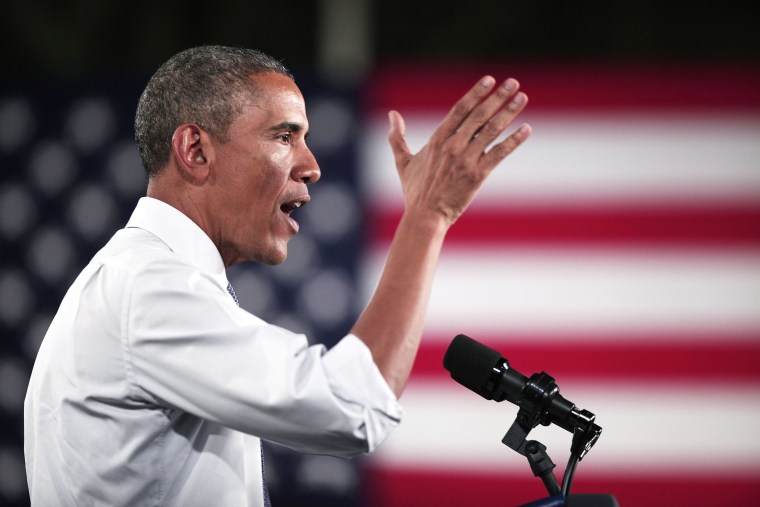When the White House said President Obama would make some public appearances in January to preview his State of the Union address, I more or less assumed he'd celebrate the improved economic recovery and talk up his usual priorities
But as it turns out, Obama still has a few fresh ideas to share. Yesterday afternoon, the president unveiled a plan to offer eligible students two years of community college for free.
"Put simply, what I'd like to do is to see the first two years of community college free for everyone who's willing to work for it," Obama said in a video announcement on Facebook. The president will officially unveil the program at a community college in Knoxville, Tennessee, on Friday. To qualify for the program, "students must attend community college at least half-time, maintain a 2.5 GPA, and make steady progress toward completing their program," the White House said. The administration estimates that the program would help about 9 million students, saving the average full-time student about $3,800 per year.
Yesterday's announcement was more of a rough sketch than a detailed blueprint, but under the White House's general vision, federal funds would cover 75% of tuition costs, while states would cover the remaining 25%. What's more, as Suzy Khimm's report noted, "To be part of the program, the community colleges will be required to offer credits that can transfer to public four-year colleges or workforce training programs with high graduation rates."
This is not the sort of policy that the administration can pursue through executive action. In other words, Obama's community college plan would need approval from the Republican Congress -- aka, The Place Good Ideas Go To Die.
But before the political world starts making assumptions about the idea's inevitable demise, it's worth emphasizing that this doesn't have to be seen as a partisan proposal.
There's nothing inherently political about higher education and/or community colleges, and in recent years, some states have already experimented with free tuition. Indeed, the idea has moved forward in the Republican-led state of Tennessee and the Democratic-led state of Oregon.
For that matter, the notion of major economic powers offering free higher education to its young people isn't exactly a rarity.
As for the price tag, the White House has not yet said exactly what the plan would cost or how it'd be paid for, but I've seen estimates suggesting a price of about $15 billion a year.
To you and me, that's an enormous amount of money. To the federal government, it is not. Indeed, before Republicans send out press releases announcing their knee-jerk opposition -- too often in the GOP's eyes, all public investment is, by definition, bad public investment -- let's not forget that lawmakers prioritize these kinds of budget decisions all the time.
Last summer, congressional Republicans pushed a series of tax breaks, costing $287 billion over the next decade, and they made no effort whatsoever to pay for them. Heck, just yesterday, GOP lawmakers voted to spend $53 billion over the next decade to give fewer Americans access to medical care.
By this reasoning, $15 billion a year to help 9 million American students isn't just a drop in the bucket, it's the kind of investment that will pay enormous dividends for the country down the road.
It's yet another post-midterm big idea from a president who has no use for the "lame duck" label. What's more, this is the sort of proposal that can -- and probably will -- be immediately embraced by Democrats in 2016 as part of the party's education platform.
